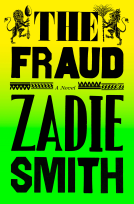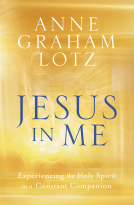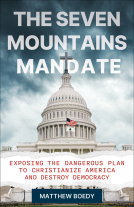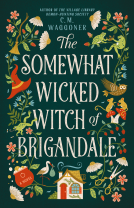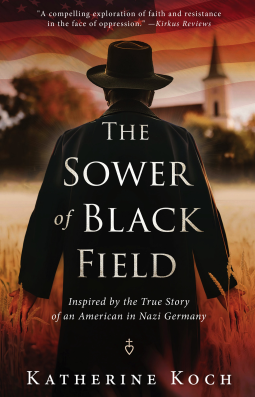
The Sower of Black Field
inspired by the true story of an American in Nazi Germany
by Katherine Koch
This title was previously available on NetGalley and is now archived.
Send NetGalley books directly to your Kindle or Kindle app
1
To read on a Kindle or Kindle app, please add kindle@netgalley.com as an approved email address to receive files in your Amazon account. Click here for step-by-step instructions.
2
Also find your Kindle email address within your Amazon account, and enter it here.
Pub Date Jan 15 2025 | Archive Date Jan 12 2025
Talking about this book? Use #TheSowerofBlackField #NetGalley. More hashtag tips!
Description
Throughout the Third Reich, millions of Germans pledged allegiance to Adolf Hitler. In the Bavarian village of Schwarzenfeld, they followed an American citizen.
Fr. Viktor Koch, C.P., has quietly ministered to the people of Schwarzenfeld throughout the war. In a time of oppression, he has struggled to keep their faith alive, despite the watchful eyes of Nazi authorities.
As he peacefully resists efforts to end his missionary work, Fr. Viktor wrestles with his heritage and identity. Why does he feel rooted in Germany? Is he following a higher calling or bound by the mystical forces of his ancestry? Awakened to the tyranny of Nazi rule, his followers risk prison to express their dissent. Relying upon his ingenuity to protect them, Fr. Viktor finds a grudging ally in a Nazi charity worker who confiscated his monastery.
In April 1945, American liberators arrive in Schwarzenfeld and make a gruesome discovery: the SS have left a mass grave of concentration camp victims on the village’s border. Enraged by the sight, the American commander holds the town responsible. He issues a chilling ultimatum—the villagers must dig up and properly bury each of the 140 corpses within 24 hours, or every German man in town will be executed.
With time running out, Fr. Viktor must perform a miracle. He must convince his countrymen that his followers are not the enemy. Their humanity is still intact. And most of all, they are innocent.
Available Editions
| EDITION | Paperback |
| ISBN | 9798987629918 |
| PRICE | $17.99 (USD) |
| PAGES | 330 |
Available on NetGalley
Average rating from 31 members
Featured Reviews
Father Viktor Koch was an American priest with the Passionists Order who felt led as a missionary to help establish a group of the same in Bavaria, Germany. Prior to reading this compelling book based on fact, I had never heard of this group before. Author Katherine Koch is a family descendent and conducted meticulous research into his life. The included photographs really personalized the story and her storytelling is stellar and original. I have read hundreds of World War II books so unique people, topics and locations turn my head. This is one of those books.
Father Koch gave hope and encouragement to those who were suffering terribly during the war. He desperately wanted to save people, a Wehrmacht veteran, his wife and son in particular. Though Nazis typically despised faith in anyone or anything other than Hitler, Father Koch somehow was able to teach and instruct. He had help in unexpected places including a Nazi charity worker. Koch pointed out that not all Germans were evil and focused on compassion and humanity in general. When American liberators arrived in 1945, mass graves were discovered, numbering 140 corpses. Koch insisted that the victims be buried humanely and expediently so called those in the village to remove the bodies, clean them and bury them properly. Not only that but he ordered that this be done in 24 hours. If not, the locals would all be shot, a bold move from a foreigner in a country where he wasn't born. What the German villagers did was incredible.
Throughout times of horror, Father Koch remained steadfast in his faith and love for fellow humans. He used both the good and the bad to point people to God. This book is a completely different perspective on WWII which I appreciate. Of course the topic is a difficult one as each one of those corpses were very real flesh and blood reminders of the dreadful Holocaust.
My sincere thank you to Book Whisperer and NetGalley for providing me with an early digital copy of this phenomenal novel which bruised my heart but encouraged it, too.
 Reviewer 857287
Reviewer 857287
“The Sower of Black Field” by Katherine Koch is historical fiction (WWII) book about her family member, Father Viktor Koch, an American priest living in Germany. This book was well researched - and the Author’s Note details what was true, what was based upon facts, and what was fictional. While I found this book an interesting one, at times I found myself skimming through some of the sections. While the story moved forward, there are a number of characters to keep track of that I rather wished for a list (maybe I missed it?). I liked how Fr. Koch’s relationship with the townspeople went beyond just a spiritual one. I also liked the care that the author gave to this story - it’s one that people should know.
 Reviewer 856978
Reviewer 856978
The author did a fabulous job helping the reader see a part of World War II Germany through the eyes of Fr. Viktor. Fr. Viktor was constantly torn between two countries that he loved and the people he was pastoring. His German family worked hard to live the values and morals Fr. Viktor preached about while trying to understand the vile happenings of Hitler’s commands. I couldn’t put this book down. Thank you for offering it.
Love that this book is inspired by a true story as that makes it more real. It is a book with depth, emotion and was quite intense. That is not a bad thing as it makes the story interesting, lets you really delve into the story and the characters and that is exactly what I did.
A very well written book but one that may not be for everyone. It is a book that reaches out to you and pulls you in and I like that. Great characters you either love or loathe. A very good book with I enjoyed.
Thank you NetGalley and Book Whisperer for giving me the opportunity to read and review this book.
Inspired by the true story of an American in Nazi Germany
The story in a few words:
The Sower of Black Field by Katherine Koch is a historical fiction novel set during the final days of Nazi Germany. The story follows Fr. Viktor Koch, an American priest of German heritage, who is deeply conflicted as he tries to guide his parishioners through the horrors of the Third Reich.
My thoughts:
I found this story hard to get into, the accurate depiction of Nazi Germany was heart-stopping from the beginning till I flipped the last page not a moment where I didn’t have chills running down my spine. The author captured the tyrannical Nazi regime expertly as well as the struggles and fear of the ordinary Germans, while the tenacity of Fr. Koch to help his parishioners never wavered. The novel is populated with a host of historical figures mixing in with the fictional ones. We have a lot of German words and names making dialogue and narrative a bit difficult at time to comprehend but in whole we get the drift and able to carry on.
What was driving Fr. Koch to stay in the Third Reich? Was he following a higher plan?
While his parishioners grow restless under the Nazi rule Fr. Victor relied upon his ingenuity to keep them safe and out of prison. With the help of a Nazi charity worker, he managed to do so. Fr. Koch was an exceptional in all manners.
To summarize:
“The Sower of Black Field” is a gripping novel that explore human resilience, faith and braveness.
I love reading about the holocaust because it’s one of the worst things in history. My mom passed her passion to me and I love reading about others who lived that life.
Very impressive! I really enjoy reading about people who are very courageous, who strive to help others so many times at their own expense! I like it most when the story is about a real person as in this case. Fr. Koch has managed so much through his integrity, his faith in god and people! This amazes me! I admire his personality. Whether or not one is a religious person, this book is fascinating: what is faith? As an agnostic I am nevertheless interested in this kind of discourse. I did learn a few things here and a lot more has made me thoughtful as for me religion illustrates a philosophical way of thinking and way of life. The characters were convincing. Their psychological development was also convincing and realistic. The historical details are well researched and here again, I learned a few details. The plot was immersive and closely follows the historical events. I highly recommend this novel!
I received a digital copy of this novel from NetGalley and I have voluntarily written an honest review.
 Carolyn F, Reviewer
Carolyn F, Reviewer
The Sower of a Black Field: Inspired by the True Story of an American in Nazi Germany
By Katherine Koch
Set in a small village in southeastern Germany, we meet Fr. Viktor Koch, a priest in the Passionist Order of Catholicism. Fr. Koch has dual citizenship with Germany and the United States and has served the Schwarzenfeld community for decades. He saved the community from starvation after WWI by employing hundreds of men to build the Miesbergkloster monastery. Fr. Koch was an uncle to the author’s grandfather. Most all of the story is true, with some name and minor date changes. Major events are factual.
This story begins in 1941 as the Nazis invade the area, and the effects of the larger war stress the resources of the small town. We meet townspeople who are anti-nazi but must hide their sentiments to survive. Norbert, who runs the bakery, Helene and her two sons, Kraus and Hans, and of course, Fr. Koch and his fellow priests.
“The car, a black and silver-trimmed Mercedes, rumbled out of the hills like thunder from a cloudless sky.”(Pg.20). Katherine Koch begins the novel with dramatic imagery. “The Mercedes skulked through his courtyard gate. It prowled within the shadow of a plaster wall that circled his church and cloister. (Pg.20) Sixty-seven-year-old Fr. Koch receives a visit from Nazi officials, and we immediately sense that things are not boding well for the Miesbergkloster. Fr. Koch ministers to his church family, “…we must stop seeing ourselves as individuals with solitary problems. No matter who you are, whether you’re rich or poor, whether you are a devout Catholic or you don’t believe in God at all, we’re connected, all of us – and on an intimate level. Were united by the reality of suffering.” (Pg.43)
As the monastery is taken over and turned into a children’s home, the Nazis remove the crucifixes from school classrooms and replace them with portraits of Hitler. Those actions set the community on fire. The citizens circulate a petition, leading to key village members' arrests. The village feels that it can no longer tolerate the Nazi invaders, yet they must survive.
Katherine Koch’s prose is poetic. She takes the reader deep into the setting and story with beautiful sensory imagery. “After reading the breviary at noon, Fr. Viktor Koch heaved open the Miesburgkirche’s wooden doors and let a breeze gust into the sanctuary. A pristine Autumn sky stretched above him. He lifted a beaming face, reveling in the sight, then froze. Christ staggered across the church courtyard and gazed at him through the stricken visage of Maria Gindele.”(Pg.110)
“Tolling thundered from a distant hilltop. It was noon. Shouts rippled below a feathery sky while his classmates reveled in freedom that felt sickly sweet.”(Pg. 104)
Each chapter begins with a dramatic statement or description. “The news broke in Schwarzenfeld on a Thursday afternoon, but Frs Viktor and Payl learned it first in the Gindele’s sitting room during their usual Saturday visit.”(Pg. 128) “In the wet, miserable dawn they lined up.”(Pg.33) The reader cannot wait to turn the next page.
Koch's masterful characterization makes the characters of this story come alive. Their voices are clear and vivid; we hear their innermost doubts, conflicts, and prayers. “Klaus groaned, but sat obediently as she wiped the red ribbon oozing down his face and throat. Aquamarine eyes shifted up to watch her; the brows arced in endearing pertness. Meeting that gaze, those clear and luminous eyes identical to her own, the young mother stood arrested.”(Pg.90)
This true story is obviously extremely well researched and told so very well. I highly recommend this important work of historical fiction and look forward to Katherine Koch's future books. Rating 5.
 Joyce K Y, Reviewer
Joyce K Y, Reviewer
Excellent book! The author, gives you both sides of the Nazis & villagers, and when the Americans arrive & take back the village. This book should be mandatory reading in high school and college! The village people really come together & try to make their difficult lives easier. The priests are able to give them their spiritual needs, even though at time they don't feel God is with them! Thank you Net galley for allowing me to read this book before the publishing date!
 Bev W, Reviewer
Bev W, Reviewer
When I was approached by Bookwhisperer to receive a copy of this book through #Netgalley to read and review , I was drawn to it by a paragraph used in it's description. "In April 1945, American liberators arrive in Schwarzenfeld and make a gruesome discovery: the SS have left a mass grave of concentration camp victims on the village’s border. Enraged by the sight, the American commander holds the town responsible. He issues a chilling ultimatum—the villagers must dig up and properly bury each of the 140 corpses within 24 hours, or every German man in town will be executed."
This sounded like nothing I had ever read before and indeed that proved to be true. The main focus of the story is Father Viktor Koch, a real person who was a Catholic priest with dual citizenship, American by birth but Austrian by heritage through his parents. When Austria was annexed by Germany he became German and this allowed him to stay in the town of Schwarzenfeld at a time when few of American birth would be allowed. His story has been meticulously researched by the author whose paternal grandfather was nephew to Father Viktor.She had the opportunity to speak with several primary sources and to visit Schwarzenfeld and see first hand the esteem with which he is still held. This book is based on his true story but has been fictionalized with several composite characters included to help tell the story of this town, it's people and what happened to them and their spiritual leader throughout the war.
I am not a Catholic, but I am an active member of a Protestant denomination, and what stood out to me in this story was the living faith of this one man Father Viktor , and how he shared it in such a way that made it real and living for his parishioners who made up most of the town. Through his preaching he opened their eyes to the idea that in everyone they meet, they should see the face of Christ and treat them accordingly. To a people who had suffered through the Great War and the desperate times that followed, his was a voice that gave them hope when little was to be found. Many had doubts and questions about why so many bad things happened in spite of their heartfelt prayers. Koch encouraged them to look beyond the obvious to see how in actual fact, prayers were being answered. He was a sower of seeds in their souls - fertile ground where growth could occur. This made them different from other towns of similar size and makeup.
The novel is loaded with details of what life was like in Schwarzenfeld, from one of the bakeries that provided food to the towns people, stories of those who had fought before, the strength of a widow whose husband had died at Dunkirk. The grief of a young teen, victimized within Hitler's Youth while grieving the death of his father, and A Nazi German "social worker" charged with caring for children being moved away from bombing in big cities. German words are used but in such a way the it is fairly easy to understand their meaning. Real photographs from the time are included in the post notes.
And then there is that paragraph that drew me to the story- after a death march from Flossenburg ened in the killing of approximately 140 Jewish people near the train station of the town, shot by the SS and dumped in the local trash yard, the American soldiers arrived, never expecting to be greeted by a priest of American birth. Their anger was extreme (understandably) but their response was unusually unique and harsh. The dead bodies must be retrieved, washed, dressed in decent clothes, buried in caskets in the local cemetery with a proper burial service and it must be done within 24 hours or all the German men of the town would be shot. It was an impossible task and one must read the book to really see how it all unfolded and what place faith in God's plan had in it all. The Americans needed to see that these townspeople were not the complicit Nazi's that they thought they were. That would take a miracle!
As I read this book, I found myself highlighting different quotes that were particularly meaningful to me. Here is one: "Prayer - real prayer - is a bonding," the provincial revealed in used awe. " It's a communion with all that is good in this universe. That grace gives us the courage to fight evil. And when evil overwhelms us, as it's doing now? Prayers gives us the strength to endure."
We live in trying times, and the message in this book has the power to inspire, change attitudes and lives. That message will hopefully stick with me through my own battles and calls to action. I would highly recommend it to others, both for it's historical content and inspirational content.
Readers who liked this book also liked:
Brian Soonho Yoon
Children's Nonfiction, Crafts & Hobbies
Kim Michele Richardson
General Fiction (Adult), Historical Fiction, Women's Fiction

